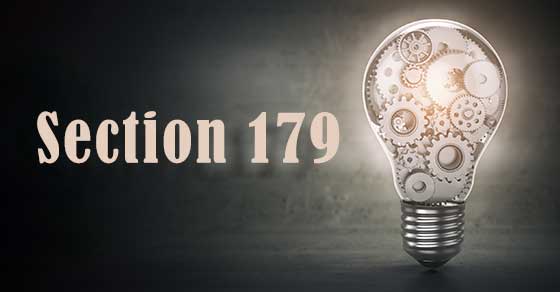It’s a good time to buy business equipment and other depreciable property

There’s good news about the Section 179 depreciation deduction for business property. The election has long provided a tax windfall to businesses, enabling them to claim immediate deductions for qualified assets, instead of taking depreciation deductions over time. And it was increased and expanded by the Tax Cuts and Jobs Act (TCJA).
Even better, the Sec. 179 deduction isn’t the only avenue for immediate tax write-offs for qualified assets. Under the 100% bonus depreciation tax break provided by the TCJA, the entire cost of eligible assets placed in service in 2019 can be written off this year.
Sec. 179 basics
The Sec. 179 deduction applies to tangible personal property such as machinery and equipment purchased for use in a trade or business, and, if the taxpayer elects, qualified real property. It’s generally available on a tax year basis and is subject to a dollar limit.
The annual deduction limit is $1.02 million for tax years beginning in 2019, subject to a phaseout rule. Under the rule, the deduction is phased out (reduced) if more than a specified amount of qualifying property is placed in service during the tax year. The amount is $2.55 million for tax years beginning in 2019. (Note: Different rules apply to heavy SUVs.)
There’s also a taxable income limit. If your taxable business income is less than the dollar limit for that year, the amount for which you can make the election is limited to that taxable income. However, any amount you can’t immediately deduct is carried forward and can be deducted in later years (to the extent permitted by the applicable dollar limit, the phaseout rule, and the taxable income limit).
In addition to significantly increasing the Sec. 179 deduction, the TCJA also expanded the definition of qualifying assets to include depreciable tangible personal property used mainly in the furnishing of lodging, such as furniture and appliances.
The TCJA also expanded the definition of qualified real property to include qualified improvement property and some improvements to nonresidential real property, such as roofs; heating, ventilation and air-conditioning equipment; fire protection and alarm systems; and security systems.
Bonus depreciation basics
With bonus depreciation, businesses are allowed to deduct 100% of the cost of certain assets in the first year, rather than capitalize them on their balance sheets and gradually depreciate them. (Before the TCJA, you could deduct only 50% of the cost of qualified new property.)
This break applies to qualifying assets placed in service between September 28, 2017, and December 31, 2022 (by December 31, 2023, for certain assets with longer production periods and for aircraft). After that, the bonus depreciation percentage is reduced by 20% per year, until it’s fully phased out after 2026 (or after 2027 for certain assets described above).
Bonus depreciation is now allowed for both new and used qualifying assets, which include most categories of tangible depreciable assets other than real estate.
Important: When both 100% first-year bonus depreciation and the Sec. 179 deduction are available for the same asset, it’s generally more advantageous to claim 100% bonus depreciation, because there are no limitations on it.
Maximize eligible purchases
These favorable depreciation deductions will deliver tax-saving benefits to many businesses on their 2019 returns. You need to place qualifying assets in service by December 31. Contact us if you have questions, or you want more information about how your business can get the most out of the deductions.
© 2019





